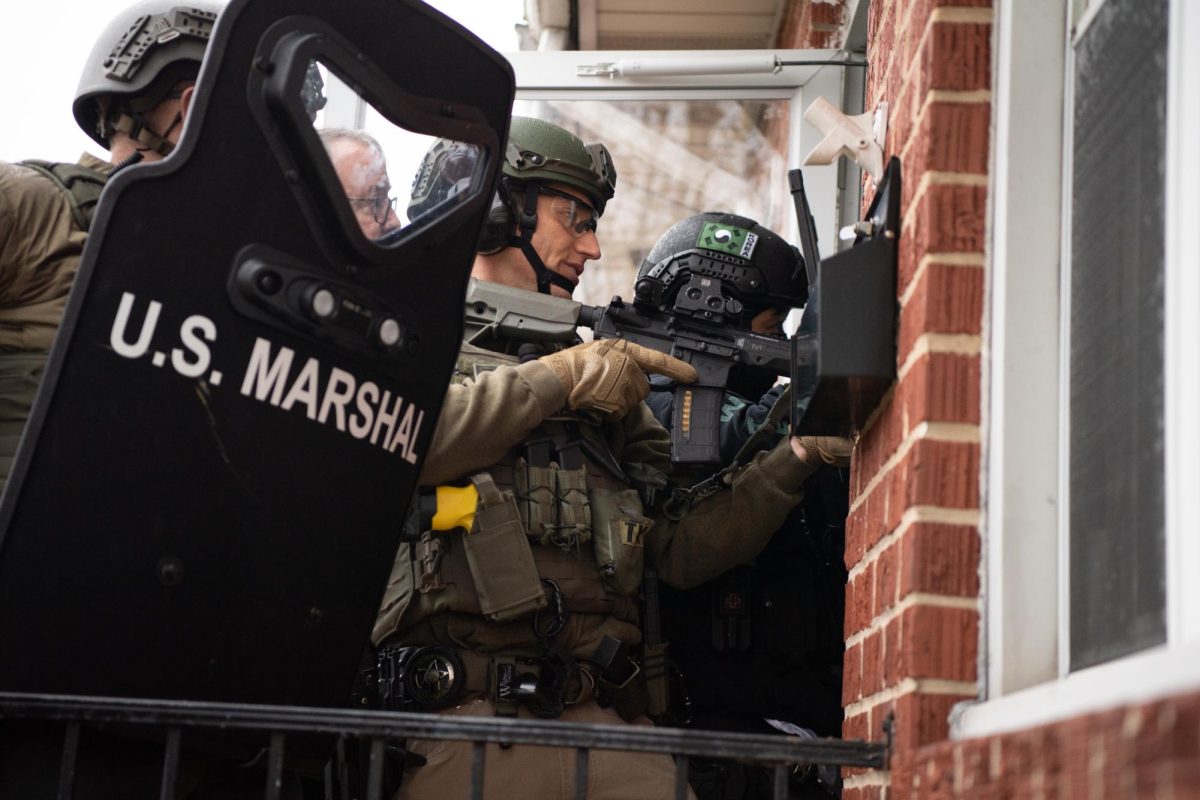Junior Acacia Burnett doesn’t have to tune in to CNN or check the president’s Twitter feed to learn about the effects of the government shutdown. For Burnett, the effects of the government shutdown are personal.

Because of the shutdown, her mother, Aphrica Farrow, is close to being out of a job at the federally-funded program Women Infants and Children, or WIC. WIC is part of the City of Austin government, and it supports women who need help supporting their kids. The program provides food, health care, and breast pumps to mothers in need and is run through the health department. For Burnett the effects would be devastating for her family losing a major source of income.
“I hope that this wakes people up that we need more unity,” Burnett said. “Division isn’t solving anyone’s problems, and it is creating more problems like people not getting paid, people getting evicted, or could be evicted from their homes. It’s not helping anyone.”
Burnett’s story is not an isolated one either. She is one of the thousands of cases of families affected by the shutdown nationwide.
With the government shutdown going into its third week, many parts of the government can not operate without funding. The national parks and monuments are closed to the public and the nearly 800,000 federal workers in the United States are either working without pay or furloughed (because their federal employer is closed). The only federal workers that are working currently are the essential services such as the United States Postal Service or the Transportation Security Administration.
These workers are working without pay and for some families the short-term but immediate loss of income is devastating. Working Americans simply cannot afford to work for free.
Freshman Finn Higginbotham’s father is in this exact position as an essential worker for the national government. His father, a federal agent, is currently working without pay. For the time, Higginbotham’s family is able to get by on his mother’s salary, but the financial strain will soon be felt by his family.
“Shutting the government down for this long just because he wants a border wall is, in my opinion, something that is not only taking away from my family and putting us in a hard position, but also other people’s families who may rely on that income a lot more,” Higginbotham said.
The one way that federal employees like Higginbotham’s father could decide to not work is by filing for unemployment or simply not showing up for work. But one thing that federal workers cannot do is strike. Under current laws federal workers are not allowed to protest the current situation, and for some of those working without pay, this fact is crushing. Higginbotham believes the best way to help is to make your voice heard by protesting the building of the wall and by calling your congressmen to tell them that enough is enough and the government cannot be closed one day longer.

The shutdown is also affecting government-funded aid such as Food Stamps. Food Stamps supply around 44.2 million Americans nationwide with funds to buy food. The funding for this program will run through January, but there has been no confirmed funding for February. Around the nation federal workers are lining up at soup kitchens and accepting donations from neighbors who are helping. The shutdown is the third shutdown in the nearly two years that President Trump has been in office and the longest one, lasting 25 days and counting. Due to its length, the shutdown is now on the verge of causing hundreds of thousands of people to lose their jobs and potentially a lot more because they are unable to pay bills or buy essential items. Without funding, government-run entities are unable to operate daily, and many people are furloughed or working without pay, as is the case with postal workers and TSA agents. Trash in the nations parks is accumulating, turning what was once natural splendor into a picture of neglect.
Junior Tyler Broz’ family is one of the families at risk of losing their home if they can not pay the bills. His step-father, a top-tier auditor for the IRS, is now out of a job, because he has been furloughed. Broz’s step-father has found part-time work in the meantime, but soon the bills on the house that the Broz family bought last summer won’t be paid.
“We have no way to pay bills or buy food and any of the basic things we need to survive, and we don’t know when the government will be open again,” Broz said.

For Broz, it’s not hard to find the source of the problem. Broz also believes the proposed wall is a bad idea for our
country
“Over the past 10 to 15 years, they’ve increased border patrol, and it hasn’t stopped anything,” Broz said. “It hasn’t done anything to curb the illegal immigration problem. There is nothing wrong with immigration, and they are expending funds that are better allocated elsewhere to this wall, and shutting down the federal government was not the right move to go for.”
For now, Broz and his family will have to wait out the storm and hope that the shutdown ends sooner rather than later.
Despite the damage it is causing to Americans, President Donald Trump has remained firm in his demand for Congress to include $5.7 billion in its budget to fund the building of a wall at the U.S. Southern border with Mexico. This source of funding is different from what then-candidate Trump said in the 2016 campaign, promising that Mexico would pay for the southern border wall. President Trump told reporters at the White House on Jan. 4 that he will essentially keep his promise, because the recently drafted United States Mexico Canada Agreement (USMCA) will bring in billions of dollars in revenue. The trade agreement, signed by the leaders of all three countries at the G20 summit on Nov. 30, has not been approved by Congress, an important step in its success.
President Trump has said that he will keep the government shutdown going “as long as it takes” in the name of national security. President Trump has even gone as far as threatening to declare a national emergency if the House of Representatives continues to refuse funding for the border wall. This declaration would allow construction on the wall to begin without funding from the House, allocating funds from the military construction funds. Since Jan. 15 however, Trump has taken that threat off the table. The president continued to claim that the Democrats are to blame for this shutdown in his address to the nation on Jan. 8.
“The federal government remains shutdown for one reason and one reason only, because Democrats will not fund border security,” Trump said.
Democratic leaders Speaker of the House Nancy Pelosi (D-California) and Senate Minority Leader Chuck Schumer (D-New York) have repeatedly opposed the proposed wall because they believe it will prove ineffective at stopping illegal immigration, as well as be a waste of taxpayer dollars. Schumer has repeatedly blamed President Trump for the shutdown, calling Trump’s storming out of the Oval Office in their meeting on Jan. 9 nothing short of a “temper-tantrum.” This is consistent with what Schumer said after the Democratic leader’s first meeting in December of 2018, with President Trump and Speaker Pelosi.
“No president should ever be proud to shut the government down,” Schumer said in a statement made in the Senate Chamber. “No president should so glibly use the American government, and the millions of workers who work so hard, as a bargaining chip. That is where President Trump is headed.”
President Trump and Senate Majority Leader Mitch McConnell have rejected offers from the Democratic leaders to reopen the government and to continue operations as normal by voting for a continuing resolution. The resolution would allow for parts of the government to be funded, beginning to opening up department by department, which would allow government workers to work again for pay and release those who are currently furloughed.
But President Trump has refused to allow a continuing resolution to be passed without securing funding for his border wall and in the Dec. 11 meeting he claimed that he had the votes in the House to support a wall–a claim that was refuted by Speaker Pelosi– saying the only thing stopping the government from reopening was the Senate, where Republicans hold the majority of 53 senators. In order for the spending bill to pass, President Trump would need the support of seven Democratic senators to reach the 60-vote threshold. The Democrats want to vote to reopen the government and believe they could have the votes to get funding without a border wall in the budget, but President Trump is not budging from his demand that funding the wall be part of the budget. Senate Republicans are backing him up.
This stalemate between the President and Congressional Democrats has led to frustration for many Americans, including Higginbotham.
“If the President decides if he wants to keep the government closed, then that’s more similar to a dictatorship than to a presidency,” Higginbotham said. “You can’t hold the government hostage because you feel something has to be done. That’s why we have checks and balances. … There’s going to be people in the government that need to be caring about their jobs to keep this country running, and they’re not going to care, because they’re not getting paid.”
UPDATE: Since the publication of this story the government has reopened temporarily for a three week period while funding for the government and the proposed border wall is debated over between the House and the President. If a funding bill agreement is not reached by Feb. 15, the government shutdown will restart or the president will declare a national emergency.










Ron Jacobson • Jul 14, 2019 at 5:19 am
Ignorant, brain-washed kids making uneducated comments on politics they are organically incapable of fully comprehending. This is why voting age must be increased to age 21, when the brain becomes fully developed.